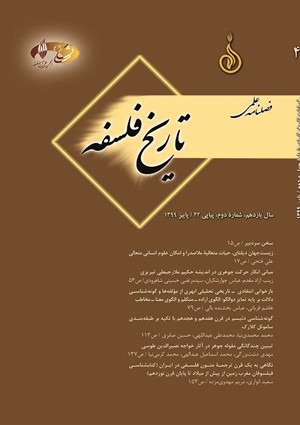گونهشناسی دئیسم در قرن هفدهم و هجدهم با تکیه بر طبقهبندی ساموئل کلارک
محورهای موضوعی : Geneology of philosophical schools and Ideas
محمد محمدینیا
1
,
محمدعلی عبداللهی
2
,
حسین صابری
3
![]()
1 - دانشجوی دکتري فلسفه، دانشگاه تهران، پردیس فارابی، قم، ایران
2 - دانشیار فلسفه، دانشگاه تهران، پردیس فارابی، قم، ایران
3 - استادیار فلسفه، دانشگاه تهران، پردیس فارابی، قم، ایران
کلید واژه: دئیسم دئوس دین طبیعی ربوبیت وحی ظهور الاهی مشیت کلارک,
چکیده مقاله :
دئیسم به دیدگاهی فلسفی و الهیاتی دربارة خداوند، انسان و دین اطلاق ميشود. مقاله حاضر تلاشی است برای تحلیل مفهومی دئیسم در قرن هفدهم و هجدهم، از طریق ریشهشناسی و روش تحلیلی ـ توصیفی و قصد دارد با استفاده از طبقهبندی کلارک، تقسیمبندیيي کلی از دئیسم ارائه کند. تعریف دانشنامهيی دئیسم دچار ایهام و ابهام است و رجوع به فرهنگنامههای ریشهشناختی نشان میدهد كه در تبدّل واژة دئوس به دئیسم، ظرائف ریشهشناختی این واژه چندان مورد توجه نبوده است. اما با گونهشناسی کلارک ميتوان تمایز دئیسم زمانة او از تئیسم و گونههای مختلف این تفکر را بهتر شناخت. طبقهبندی چهارگانة کلارکی، بمثابه نخستین گزارش جامع از دئسیم، مدعي است که قرابت و شباهت دئیسم به مسیحیت، از نوع اول تا نوع چهارم، بصورت پلکانی از حداقل به حداکثر میرود. دئیستهای نوعِ اول، منکر مشیت الهی هستند، در حالیکه به وحدت، خالقیت و علم خداوند اعتقاد دارند. دئیستهای نوع دوم، ضمن باور به گزارههای دئیسم نوع اول، قوانین فیزیکی را مشیت الهی میانگارند اما شمول مشیت بر قوانین اخلاقی را نفی میکنند. دئیستهای نوع سوم معتقدند مشیت تدبیری خداوند با کمالات اخلاقی او ارتباط دارد و خداوند با صفات عدالت، خیر و درستی بر این جهان حکم میراند. دئیسمِ نوع چهارم، علاوه بر آموزههای فوق، جاودانگی روح و ثواب و عقاب اخروی را نیز میپذیرد. به ادعای کلارک، تمامی انواع دئیسم مدرن در انکار وحی مسیحی مشتركند و يكي از تفاوتهای اساسی آنها با ادیان وحیانی، مفهومشناسی و اعتقاد به وحی الهی است.
Deism refers to a philosophical and theological view of God, Man, and religion. The present paper aims to provide a conceptual analysis of Deism in the 17th and 18th centuries through exploring its etymology and following an analytic-descriptive method. Moreover, it is intended to present a general classification of Deism based on Clarke’s classification. An encyclopedic definition of deism suffers from ambiguity, and a reference to etymological dictionaries reveals that the etymological subtleties of this term have not been taken into consideration in the conversion of dues into deism. However, through Clarke’s classification, one can develop a better grasp of the distinction of the deism of his time from theism and its different types. Clarke’s four-fold classification, as the first comprehensive report of deism, claims that the proximity and similarity of deism to Christianity, from the first type to the fourth type, proceeds stepwise from a minimum to a maximum. Deists of the first type reject divine providence but believe in unity, creation, and God’s knowledge. The second group of deists, while believing in the deistic propositions of this type, consider physical laws to be ruled by divine providence but reject its rule over ethical laws. The third group believe that God’s providence is related to His moral perfections, and He governs the world relying on His moral attributes including justice, benevolence, and honesty. Finally, deists of the fourth type, in addition to the above doctrines, believe in the immortality of the soul and otherworldly reward and punishment. According to Clarke, all types of modern deism deny the Christian revelation, and one of the main differences from revealed religions is conceptology and believing in divine revelation.
باربور، ایان (1379) علم و دین، ترجمة بهاءالدین خرمشاهی، تهران: مركز نشر دانشگاهی.
بروک، جان هدلی (1381) «الاهیات طبیعی»، ترجمة فرشاد فرشته صنیعی، نامه علم و دین، شمارة 17 تا 21، ص58ـ39.
پنلهوم، ترنس (1383) «ربط و نسبت عقل و ایمان»، ترجمه احمدرضا مفتاح، پژوهشهای فلسفی کلامی، شمارة 20 و 21، ص147-123.
خاتمی، محمود (1395) مدخل فلسفه روشنگری، تهران: علم.
ریتر، یوآخیم و همکاران (1391) فرهنگنامه تاریخی مفاهیم فلسفه، ج2: الاهیات، ویراستاران محمدرضا بهشتی و بهمن پازوکی، تهران: مؤسسه پژوهشی حکمت و فلسفه ایران.
فلو، آنتونی (1383) «هجرت از الحاد به خداباوری»، ترجمة محمدعلی عبداللهی، نقد و نظر، شمارة 35 و 36، ص312ـ279.
کاپلستون، فردریک (1387) تاریخ فلسفه، ج5: از هابز تا هیوم، ترجمة جلالالدین اعلم، تهران: علمی و فرهنگی.
کانت، امانوئل (1374) «دین طبیعی»، ترجمة منوچهر صانعی درهبیدی، ارغنون، شمارة 5 و6، ص334ـ293.
کریمی مرتضی (1382) « آشنایی با دئیسم»، معرفت، شمارة 74، ص76ـ66.
کلارک، ساموئل (1381) مکاتبات لایبنیتس و کلارک، ترجمة علی ارشدریاحی، قم: بوستان کتاب.
منصوری، یدالله (1396) «یادداشتی پیرامون ریشهشناسی»، زبانکاوی، شمارة 5، ص125ـ117.
ویسلی، وایلدمن (1386) «در جستجوی هماهنگی؛ تفسیر الهیات و علم معاصر»، ترجمة ابوالفضل حقیری قزوینی. ذهن، شمارة 32، ص178ـ149.
Audi, R. (2015). The Cambridge Dictionary of Philosophy. New York: Cambridge.
Bunnin, N. and Yu, J. (2004). The Blackwell Dictionary of Western Philosophy. USA: Blackwell.
Craig, E. (2005). The Shorter Routledge Encyclopedia of Philosophy. London and New York: Routledge.
Edwards, P. (1967). Encyclopedia of Philosophy. New York: Pearson College.
Eliade, M. (1987). Encyclopedia of Religion. USA: Macmillan.
Force, J. (1996). Samuel Clarke's Four Categories of Deism, Isaac Newton, and the Bible, Scepticism in the History of Philosophy, Popkin, Richard (ed.), London: Kluwer Academic Publishers, pp. 53-75.
Klein, E. (1971). A Comprehensive Etymological Dictionary of the English Language. one volume edition, Amsterdam: Elsevier.
Klintberg, C. (2011). On Samuel Clarke’s Four Types of Deists. Archiv für Geschichte der Philosophie [Archive for the History of Philosophy], No 93, pp. 85-99.
Partridge, E. (1966). Origins: A Short Etymological Dictionary of Modern English. London: Routledge.
Skeat, W. (1980). A Concise Etymological Dictionary of the English Language. New York: Perigee Books.
Skeat, W. (1888). An etymological Dictionary of the English Language. London: Oxford University Press.


